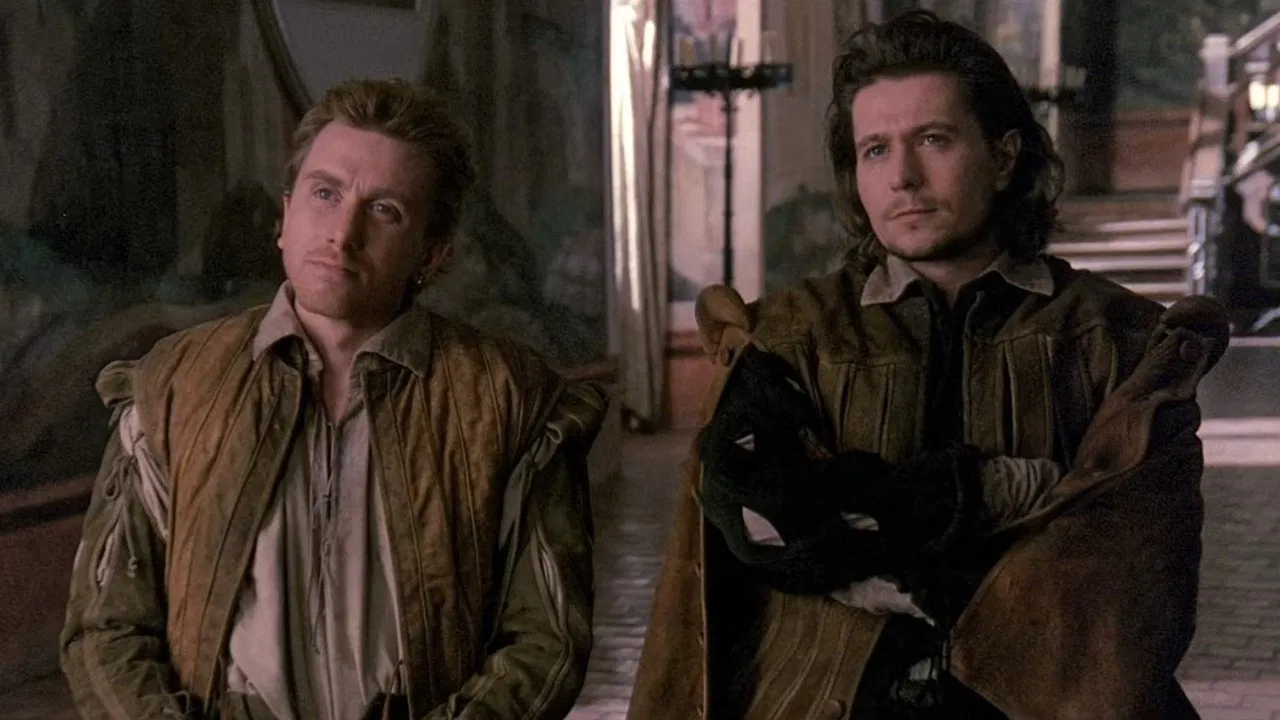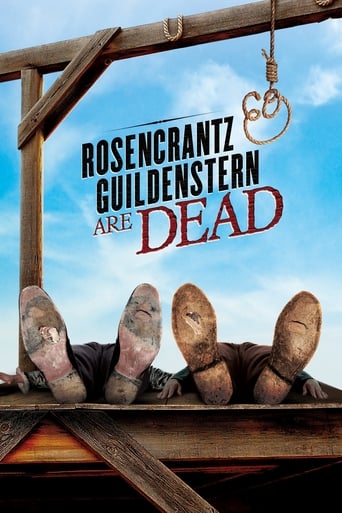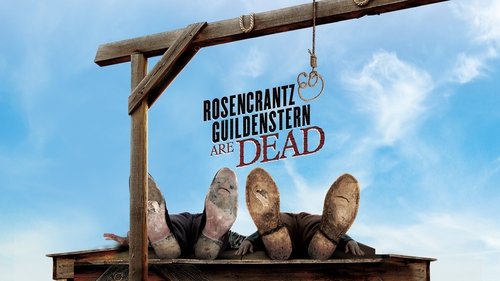GarnettTeenage
The film was still a fun one that will make you laugh and have you leaving the theater feeling like you just stole something valuable and got away with it.
SeeQuant
Blending excellent reporting and strong storytelling, this is a disturbing film truly stranger than fiction
ActuallyGlimmer
The best films of this genre always show a path and provide a takeaway for being a better person.
Darin
One of the film's great tricks is that, for a time, you think it will go down a rabbit hole of unrealistic glorification.
chaswe-28402
Written and directed by Tom Stoppard, and just possibly a tad too much of both. A bit brilliant but long. If you don't know your Shakespeare, you'll be as much at a loss as R & G. If you know him and his Hamlet, you'll find stuff to intrigue you. But why is it G, or is it R, almost eurekas Archimedes principle, discovers gravity, the equal and opposite reaction, the conservation of energy, mechanical dynamics, invents the steam engine and the biplane? What has this to do with Hamlet, or anything else ? Fantastic settings, lovely costumes. A bit like Bergman's Magician. Great acting. But life gets tedious, don't it? Even when there's a puppet play within a play within a play within a play. Almost overkill. A lot of ins and a lot of outs, but not quite as funny as TBL. Johnson thought Shakespeare's wordplay went on a bit; maybe the same applies here. Tom's a mind to amaze, but he was only learning film direction. Death is a ship, that's true enough. This may not be helpful, but why should a film review be helpful ?
Eric Stevenson
"Rosencrantz & Guildenstern Are Dead" has a unique record in that it's actually the most critically acclaimed movie that Roger Ebert gave zero stars to. It has a 64% on RottenTomatoes (which admittedly isn't that high) but a 7.6 here so it's easily the best one he ever thought was one of the worst movies ever. The weird thing is that in this review he honestly doesn't go into much detail on why it's so horrible. He just says it isn't meant to be a movie and better off as a play. Well, I guess that makes sense, but really zero stars? While not a masterpiece, I ended up enjoying it.This wasn't directly based on a play by William Shakespeare, but actually based on a play based on "Hamlet". The conversations in this movie are very nice and really do get philosophical. Oh, and they do die at the end. There's nothing wrong with these characters at all, especially with how they end up meeting the same fate as the other main characters showing how well they are connected. The backgrounds and sets look very nice and I like how an actual play is part of the story, sort of doing a satire on the very play they're performing in real life. Have to disagree with Ebert, this film is fine. ***
Ethan Kaiser
Rosencrantz and Guildenstern are dead blends the laws of nature with the principles of existentialism; Through this 'comedic' duo of Rosencrantz and Guildenstern, Tom Stoppard gives the audience a clear understanding of the existentialistic lifestyle: no matter what choices they make, they are trapped under the predestined death that awaits them both on the stage and in the film.The similarities between the stage and the cinema can be compared with the similar devices that are used: The camera, much like a stage, is an instrument that is used to see exactly what is placed before it. The objective now becomes not necessarily what to show the audience, but what not to show them. The audience is in full awareness that you have the power to show them anything you want at any given time, and in this case, what not to show them is Hamlet.The film is started with Pink Floyd's soundtrack 'Echos'.And no one showed us to the land And no one knows the where's or why's But something stirs and something tries And starts to climb towards the light -'Echos' by Pink FloydThis musical choice of Stoppard's soundtrack for the film could not be better. 'Echos' begins with faint sounds of radar, which exemplifies Rosencrantz and Guildenstern's search for themselves; however, they are yet do discover that through their inevitable fate, their constant search for identities will never matter. The lyrics (although instrumented for the film) furthermore develops Stoppard's relationship to The Theatre of the Absurd of not knowing how, why, or what they were doing there. This instrumental version of the track shows how Stoppard (knowing that the lyrics are absent) still took on the great integrity to the song's meaning. As far as the echoes go in the film (pun intended), Rosencrantz and Guildenstern shout several different words throughout the movie, and in turn, are faintly heard by the other characters. This phenomenon might just be Rosencrantz and Guildenstern near the edge of breaking through the script, but as much as they try, they are unable to: they simply reverberate and fade back into their state of nothingness: they cannot escape. Guildenstern seems to have an interesting approach to this dilemma, saying that simply choosing 'what you want' overrides the agony of this universal determinism. "There's a logic at work–it's all done for you, don't worry. Enjoy it. Relax. To be taken in hand and led, like being a child again" (Pg 40). This philosophy was distinguished by Davd Hume, commonly referred to as Compatibilism. Compatabilism says that if your not 'enjoying' life, then what's the purpose of living? Stoppard seems to take a stab at Hume's philosophy with this play, showing that regardless of their fulfillment or enjoyment. Throughout the plot, their inevitable death's give them misery and anguish to constantly worry about. The Theatre of the Absurd is not just about existential philosophy, it establishes and questions all the different philosophies as well. Rosencrantz and Guildenstern are Dead addresses types of comedy like low, high, farce and even the more philosophical Comedy of Ideas. Between scenes of the film, pages are seen flying across screen, both before and after the scene change. These pages are commonly believed to be script pages; however, when taking a closer look, one would notice that the text originates from the Roman Missal, quite contrary to the anti-religious consistency the play develops. Here, Stoppard is adding yet another element to the play's determinism. Now, it becomes not what is controlling their fate, but who. When adding this religious context, the characters may indeed be controlled by God, and in result may be predestined to death by God himself: He leads us where we are destined to belong. Ros and Guil constantly question their existence throughout the time-frame of the play. With the many layers of philosophical inquiries and comedic ideas, one could agree that the final piece to this existential crisis lies in its many layers of reality. When the tragedians perform the play to King Claudius, Stoppard adds yet another level of existence to this play in the film. The first level, being the story of Hamlet, to the second plot of Rosencrantz and Guildenstern,then on to the Tragedians performance to Claudius, and the final, being the puppet show inside this performance of the Tragedians. This play-within a play-within a play-within a play-within a play exemplifies the many levels of existence and questions the reality of each: which is the real reality? Stoppard uses this clever approach to existentialism to show the true agony and misery Rosencrantz and Guildenstern face throughout their redundant lives, repeating each time the play commences. Both the film and play portray the existential lifestyle Ros and Guil are destined to face. No matter what they do, what they try, or what they don't do for that matter, all result in the same outcome. Even if they decide to enjoy their multi-layered cheeseburger and sail away on boats, Rosencrantz and Guildenstern truly cannot be free, regardless if they are trapped behind the stage, or'boxed' in the screen. Throughout the story, Stoppard ingeniously brought these characters to life–only to let them discover that they ultimately must die.
Jason Marshall
This movie is about background characters in a famous play that I have never seen nor read. Maybe this makes me a dunce. Oh well.In the movie, two men travel around and do a lot of pointless talking. Occasionally, other people barge in on the pointless talking and then quickly exit. My friend who likes this movie explained that these other people are the main characters of Hamlet.When the main characters of Hamlet aren't interrupting the pointless talking, one man plays with clever gadgets to try to keep himself from being bored. The second man rambles constantly and breaks the first man's gadgets. That's the whole movie, as far as I could tell. Three minutes of Punch and Judy would've been more entertaining.


